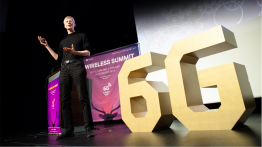Bell Labs President to Visit Cooper
POSTED ON: January 13, 2023

On Wednesday, January 18, 2023, the Albert Nerken School of Engineering will welcome Peter Vetter, president of Bell Labs Core Research, to tour Cooper’s facilities, meet with students and engineering faculty members, and deliver a guest lecture for students in the Frederick P. Rose Auditorium. The talk, titled “The Journey to 6G,” will highlight the latest research from the Nokia Bell Labs team and their vision for the next-generation cellular data network starting in 2030.
Vetter has been on the senior leadership team of Bell Labs since 2013 and heads an eminent global research organization with the mission to create game-changing innovations that define the future of networks and support Nokia’s core business. During an international career of nearly thirty years in research leadership, mostly in fixed and mobile networks, he and his teams have developed several world-first system demonstrations and successfully transferred industry-leading concepts to Nokia’s business groups. His presentation to Cooper students will include discussion of cloud-based network architectures that utilize AI for automation and performance optimization, new spectrum technologies, post-Shannon communication, networks with a sixth sense, and the future of quantum security.
Vetter’s visit to The Cooper Union builds on a broader initiative in the School of Engineering to foster industry connections and expose students to unique learning opportunities and cutting-edge technologies, particularly as the school prepares to launch a computer science program.
“We are excited about this collaboration with Bell Labs and the rich opportunities it provides for our students and faculty,” says Barry L. Shoop, dean of the School of Engineering. “Like Cooper engineering, Bell Labs has a rich heritage of innovation and technological leadership. Researchers at Bell Laboratories are credited with the development of radio astronomy, the transistor, the laser, the photovoltaic cell, the charge-coupled device (CCD), information theory, the Unix operating system, and a number of different programming languages.”
Last semester, Bell Labs generously donated tools and equipment to the Albert Nerken School of Engineering in support of research and instruction in both electrical and mechanical engineering. The donation included two gigahertz-class oscilloscopes for applications such as wireless circuit board design; a Rigol broadband spectrum analyzer, which can be used for signal discovery across a variety of disciplines, from automotive and acoustics to radio and imaging; and an HP signal generator for mimicking waveforms in circuit and sensor testing.
Bell Labs also gave The Cooper Union a Nikon microscope, which is already being used for research in a micro-vehicles lab run by Michelle Rosen, assistant professor of mechanical engineering. According to Doug Thornhill, the laboratory and technician manager for the School of Engineering, the microscope will also aid in material science courses, enabling students to investigate alloy grain structure.
Peter Vetter is president of Bell Labs Core Research at Nokia Bell Labs. He received the degree of physics engineer from Gent University, Belgium, in 1986 and a Ph.D. in 1991. After a post-doctoral fellowship at Tohoku University in Japan, he joined the research center of Alcatel (now Nokia) in Antwerp in 1993. Since 2009, he has worked at Bell Labs in Murray Hill, New Jersey, and has been on the senior leadership team of Bell Labs since 2013 and served as president of Bell Labs Core Research since 2021. Vetter has authored over 100 international papers and presented keynotes and tutorials at major technical industry events. He is a Bell Labs Fellow and IEEE Fellow. He was also co-founder of an internal venture that produced the first FTTH product in Alcatel.
Bell Labs Core Research is exploring and innovating the key technologies that will prepare Nokia’s core business for the 6G era on a 10-year horizon. That includes foundational research on network architecture, programmable-network systems and security, optical systems and components, mobile radio systems, and platforms and ASICs.




